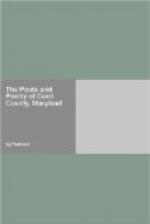The pleasures of earth are but few,
And scarce for our sorrows repay,
But we catch, in sweet moments like this,
A glimpse of the perfect day.
When I reach the Celestial City
And gaze from her golden tower,
Methinks my freed spirit would turn
Far back, to this rapturous hour.
And as angels are harping their songs—
Sweet songs of a heavenly birth—
I’ll listen to hear the same touch
That played us this prelude on earth.
LINES
ON THE DEATH OF A FRIEND.
We loved thee—yes, we loved thee,
But the angels loved thee too;
And so thou now art sleeping
’Neath the sky so bright and blue.
Sleeping now thy last long slumber,
In the low and quiet tomb,
Where life’s ills can ne’er disturb thee—
Where sorrow ne’er can come.
What tho’ our hearts are bleeding,
And our lonely spirits mourn,
That thou with Spring’s sweet flow’rets
Wilt never more return,
We would not call thee back, dear friend,
To life’s dull path again;
Where thorns amid the flowers,
Would often give thee pain;
But sweetly rest thee, dear one,
In thy long and dreamless sleep,
Nor heed the sighs above thee,
And the blinding tears we weep.
MRS. MARY ELIZA IRELAND.
Mrs. Mary Eliza Ireland, the daughter of Joseph Haines and Harriet (Kirk) Haines, was born in the village of Brick Meeting House, now called Calvert, January 9, 1834. In early life she married John M. Ireland, son of Colonel Joseph Ireland, of Kent county, Md. They are the parents of three children, one of whom died in infancy. They now reside in Baltimore, where Mr. Ireland holds the position of United States storekeeper in the Internal Revenue Department.
Until the past few years Mrs. Ireland has always lived in the old homestead where she was born and married, and from whence her parents were removed by death.
Her first literary effort was a short story written when quite a young girl, entitled “Ellen Linwood,” and published in the Cecil Whig, then edited by the late Palmer C. Ricketts, under the nom de plume of “Marie Norman.” For several years after the publication of “Ellen Linwood” Mrs. Ireland occasionally contributed to the Cecil Whig and Oxford Press.
Some years ago she wrote a story for Arthur’s Magazine, and being in Philadelphia soon after it was written, she took it to the publishing house, and there met for the first time T.S. Arthur, whom she had known from childhood through his books. He received her kindly, promised to read her story, and to let her know his decision the next day. That decision was, that though entertaining and well written, it was scarcely suited to his magazine. He suggested another periodical where it would likely meet with favor. He also asked for another story, and presented her with a set of the magazines that she might see the style of writing that he desired.




